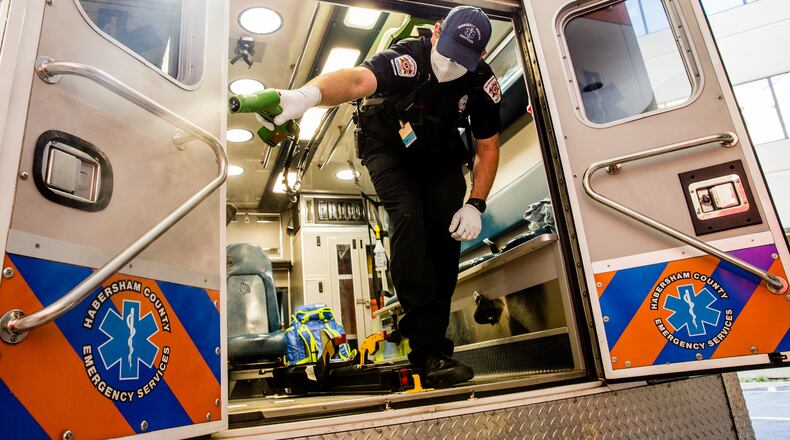Georgia reported one of its heaviest ever days of new COVID-19 cases on Wednesday as labs and other providers continue to sort out a backlog of tests stemming from Thanksgiving week.
Public health officials say it’s likely too soon to know what impact Thanksgiving gatherings and travel might have had on Georgia’s coronavirus epidemic. Exposures over the holiday weekend, experts say, might not manifest into symptoms that would send people to seek tests for several days.
Testing centers reduced hours or closed between Thanksgiving and Sunday, and health departments in Fulton and DeKalb counties reduced hours at drive-thru test sites amid this week’s frigid weather.
The state Department of Public Health (DPH) reported 5,777 net new confirmed and antigen positive cases on Wednesday. Of those, 4,094 cases were confirmed by molecular PCR testing, the highest confirmed case figure since August.
Nancy Nydam, a spokeswoman for DPH, said Wednesday’s figures reflect “the lag in reporting” over Thanksgiving and the weekend. But Georgia, she said, “shouldn’t be seeing too much more of that.”
“However, keep in mind that testing is up, so the increases after (Wednesday) should, for the most part, be daily reporting,” Nydam said.
Still, it would not be unexpected for daily reports to be bumpy for at least the next few days, said Amber Schmidtke, a public health researcher and former Mercer University professor who tracks Georgia’s epidemic on her widely read blog.
“I anticipate we’ll see something closer to normal Friday of this week or Monday of next week,” she said. “It’s not like the disease takes a break because the temperatures are cold. We just don’t know about it.”
‘Surge upon a surge’
In the days leading up to Thanksgiving, Gov. Brian Kemp and Dr. Kathleen Toomey, the state’s top doctor, urged Georgians to re-think holiday gatherings, shift to virtual celebrations if possible, or move holiday meals outdoors and wear masks while not eating to help mitigate the spread of COVID-19.
The seven-day rolling average of Georgia’s confirmed cases and antigen positive cases is only about 10% lower than the peak for confirmed cases during the state’s summer surge, though the positivity rate for PCR tests is currently lower than in the summer, suggesting Georgia’s testing network is capturing more cases now.
But public health experts have feared Thanksgiving and the risk for massive spread as cases have been rising in Georgia since early October.
“What we’re worried about is a surge upon a surge,” Schmidtke said.
Memorial Day helped trigger the summer surge that saw cases spike through June and July. If people were not cautious and did not follow public health guidelines over Thanksgiving, it’s possible another surge could follow, experts warn.
Georgia remained in the COVID-19 red zone last week, according to President Donald Trump’s coronavirus task force. Georgia’s case rate remained flat from the week prior on a per capita basis.
The White House Coronavirus Task Force said Georgia ranked 48th, or fourth-best out of the 50 states and Washington, D.C., for the rate of new cases for the seven days that ended Friday. That ranking remained unchanged for the past three weeks.
But the case figures used by the task force to compare Georgia’s standing only include confirmed cases as determined by molecular PCR tests and not rapid antigen tests. Some states combine PCR and antigen positives in reports of daily cases as recommended by the White House task force.
On that basis, it’s not an apples-to-apples comparison, clouding the public’s view of the state of Georgia’s pandemic relative to other states.
To date, Georgia has reported 428,980 confirmed cases and 53,159 antigen positive cases. Georgia also has reported 8,830 confirmed deaths attributed to the virus, including 35 reported on Wednesday.
In its report, dated Sunday, the White House task force said 70% of Georgia counties have moderate or high rates of virus transmission.
“If you are under 40, you need to assume you became infected during the Thanksgiving period if you gathered beyond your immediate household,” the White House task force warned.
Nationally, the task force said the U.S. is “in a very dangerous place due to the current, extremely high COVID baseline and limited hospital capacity.” The report also said mitigation efforts in many parts of the country remain inadequate.
“A further post-Thanksgiving surge will compromise COVID patient care, as well as medical care overall,” the report said.
About the Author
Keep Reading
The Latest
Featured


